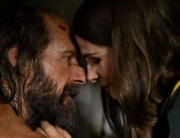Released by ShortsHD
97 min. Not rated
“Do I Have To Take Care of Everything?”
The briefest, by half, of this year’s Oscar nominated live-action shorts makes more of an impact than its tone and brevity might suggest. The Finnish short covers a morning in the chaotic life of the Ketonin family, scrambling like mad to get to a wedding. Mother Sini utters the titular line, and for most of the time she bosses her oafish but loving husband, Jokke, around, and he happily complies. Sini bounces between nagging Jokke to look presentable for the big wedding and directing her two girls on what to wear “whatever people wear to parties.” Of course, the girls end up dressing in Halloween costumes and Jokke sports perhaps the most poorly knotted tie ever seen on film. There is a sharp twist at the end that brings Sini down from her domineering heights and shows how, despite her apparently constant irritation with Jokke, they are very much the right match for each other. When you see them share this realization, it’s a pretty touching moment.
“The Voorman Problem”
Creepy and smart, “The Voorman Problem” tells of a Dr. Williams (played by the ubiquitous Martin Freeman) called to a prison to declare a prisoner, Mr. Voorman, insane, so he can be transferred to an asylum. Freeman always radiates logic, calm, and decency in his roles (James Watson on Sherlock, Bilbo Baggins, Tim Canterbury on The Office), and contrasting that with the subtly menacing Voorman (Tom Hollander) works very well. Mr. Voorman believes that he is a god, but the real problem is that he has convinced his fellow inmates of this as well. The governor of the prison has given up and taken to the bottle—Williams’ s insanity diagnosis is his last hope to reclaim control.
Dr. Williams of course has seen this kind of thing before, and he embodies professional confidence in his first meeting with Voorman. The fun here is in seeing how this confidence irrefutably erodes as the screws of supernatural power get turned deeper and deeper. Dr. Williams at first ignores the hints of Voorman’s power—like his casually referencing things about Williams that he could not possibly know—but eventually Voorman’s authority becomes undeniable. The most impressive thing about this film is how steeply Dr. Williams’ sanity declines in such a limited span of time, but also how convincing it is, for the most part.
“Just Before Losing Everything”
This French entry, the best of the bunch by a mile, is among the most effective recent depictions of how nightmarish violence can weave its way into the most ordinary milieu. With its masterfully subtle building of foreboding, it is a bit like a fusion of 2011’s ultra-creepy We Need to Talk About Kevin and some of the more harrowing episodes of Breaking Bad. The short’s compression gives it greater tension than Kevin, which was more of a comprehensive critique of suburban alienation than an exercise in suspense. Breaking Bad‘s dramatization of a sociopath maintaining a somewhat functional family life always had at least a hint of a humorous undercurrent, while Just Before Everything could not be more serious. The similarity is in the awkwardness of people around the sociopath’s family trying to keep things moving along in a standard way—absorbing the effects of violence without allowing everything to be thrown into chaos.
The bulk of the piece takes place at the supermarket where abuse victim Miriam works, while her dangerous husband prowls the massive store, asking her co-workers where she is. The staff has hidden her, along with her two children, in the back offices and break rooms, and Miriam works frantically behind the scenes telling the staff on the floor how to trick and distract him. The only warmth in this story comes from the shelter that Miriam’s co-workers provide, but even that has a limit. There are a few jolting crescendos where everyone’s facade of professionalism cracks, but mostly this is a masterful study in people holding it together in an absurdly uncomfortable situation. It is thrilling, heartbreaking, and riveting.
“Helium”
Heaven is boring, and we should imagine something better. That is the bold premise of this Danish short about a friendship between morose hospital janitor Enzo, who lost his brother to illness when he was young, and a dying boy named Alfred. As might be evident from its subject matter, the film is precariously on the edge of saccharine Oscar bait, but it rises above schmaltz thanks to the cleverness of Enzo’s explanation of where Alfred will be going instead of boring old heaven. Enzo uses the real-life example of helium, the second lightest and most abundant chemical element in the known universe. It really is a very cool element.
Enzo explains that such a curious element must have come from somewhere special, and that place is Helium, a magical realm far more interesting than the pearly gates. Perhaps surprisingly for a short film, there are several impressive fantasy sequences where we see what Helium looks like, and we can understand Alfred’s wonderment at the idea, especially since its based in a chemical element. Science-based awe is never a bad thing, but for a film so forward as to call heaven boring, it feels a bit safe overall. Helium maybe a less boring destination than heaven but perhaps not that much less.
“That Wasn’t Me”
This Spanish entry about child soldiers in an unspecified African country is, as would be expected, brutal, ugly, and graphic. Two white doctors and a guide are merrily driving and laughing across a treacherous landscape, comfortable that their noble intentions and warm hearts will protect them from the violence plaguing the area. Of course, they are quickly disabused of this, and a small army of child soldiers, controlled by an appropriately monstrous adult leader, decimate the idealistic group. The children are certainly capable of murder, but require some motivation and intimidation to do it by their leader. We actually see them have their innocence bullied out of them in real time as they are forced to get blood on their hands. Things become as graphic as they possibly can.
The wrinkle that elevates this from just a collection of shocking violence is the inclusion of a future scene where a child soldier gives a speech to a rapt audience of his peers—children without his horrible history—in which he confesses to the crimes he was forced into and reflects on the ordeal. Acknowledging how unfathomable his life must seem to outsiders, he tells them that being a soldier is easy—it just requires following orders and being loyal. The hard part is becoming yourself again afterwards. But who is he apart from the horrible things he was forced to do in his most formative years? He doesn’t know, but if the fact that he’s managed to get to a stable school and give a talk is any indication, he has made a good start.







Leave A Comment